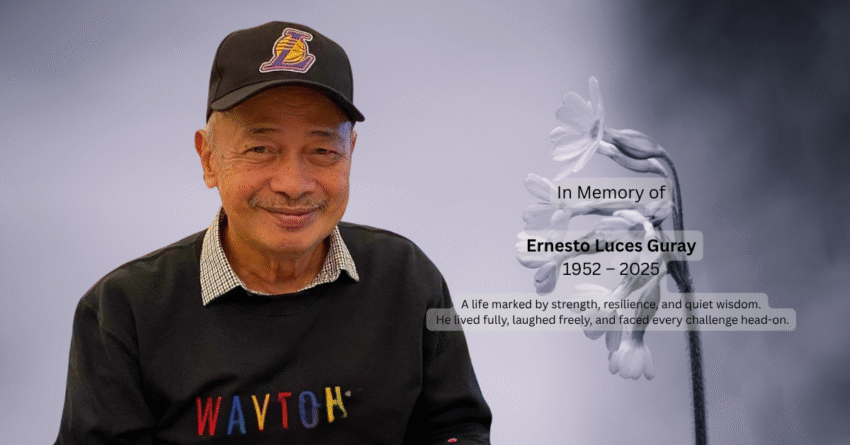A week ago, my father, Ernesto Luces Guray—known fondly as Ernie—passed away. He was 72 years old.
Our relationship wasn’t perfect. For many years, it was marked by silence, estrangement, and unresolved tension. We both carried the weight of missed moments and misunderstood intentions. But in the later years of his life, my father began showing up again—in ways that mattered. And perhaps, that’s what counts most.
Despite having suffered nine strokes over time, he displayed a quiet defiance, a stubborn will to live. Like a cat with nine lives, he kept pushing forward—one slow, steady breath at a time. And slowly, he found his way back into my life.
Toward the end, he was there. Not always with words, but with presence. In a world where presence is often undervalued, his meant everything. It was a kind of quiet redemption—a subtle, unspoken reconciliation that reminded me healing doesn’t always arrive with fanfare, but with small, consistent acts.
This week, I’ve felt the heavy pull of grief, but also the unexpected gravity of grace. Meetings and tasks continued, but I was moving through each with a quiet ache. Grief reminds us of our humanity—how deeply we feel, how much we remember, and how even as we move forward, we carry pieces of what we’ve lost.
And in this space of loss, something else became clear: we see who truly stands with us. Not for appearances, but with sincerity. Not just in the good times, but in the most vulnerable ones. These moments—funerals, farewells, and silent grief—reveal the people who hold us without needing to be asked.
As I reflect on my father’s passing, I also reflect on what it means to be a father and a man today. Our society still doesn’t do enough to support the emotional journeys of men—especially fathers. Too many carry their pain alone. Too many never get the tools or support to show up fully for their families.
I believe it’s time to change that.
We must strengthen support for programs that help men reconnect—with themselves, with their children, with their partners. Programs that invite vulnerability, growth, and transformation. We need to create more space for men to become the fathers and husbands they aspire to be—even if they’re starting late. Because it’s never too late to try.
A Life Remembered, A Legacy Carried Forward
Papa, thank you for coming back. Thank you for trying. Thank you for showing me that healing—even imperfect healing—is still healing.
You’ve reminded me to lead with heart, to forgive when possible, and to show up even when words fail.
Rest well, Papa. You used every one of your nine lives with purpose—and your story lives on in all of us who loved you.


